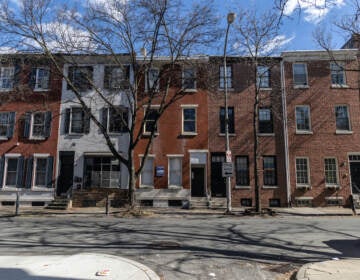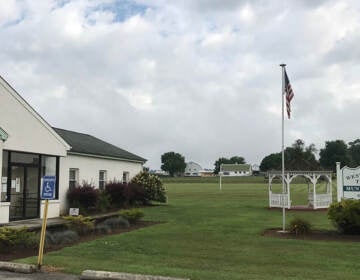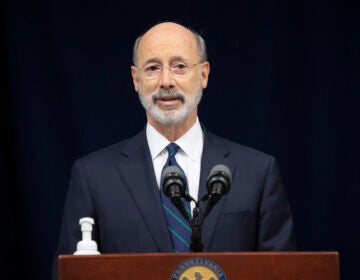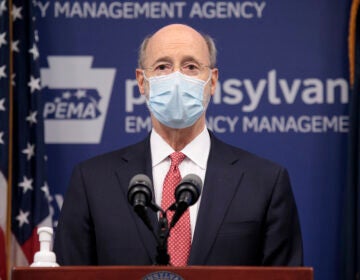Philadelphia is poised to cut business, city wage taxes — again
Philadelphia City Council leaders are proposing a small cut to business taxes, but a coalition of business chambers of commerce are pushing to slash taxes in the next decade.
Listen 1:21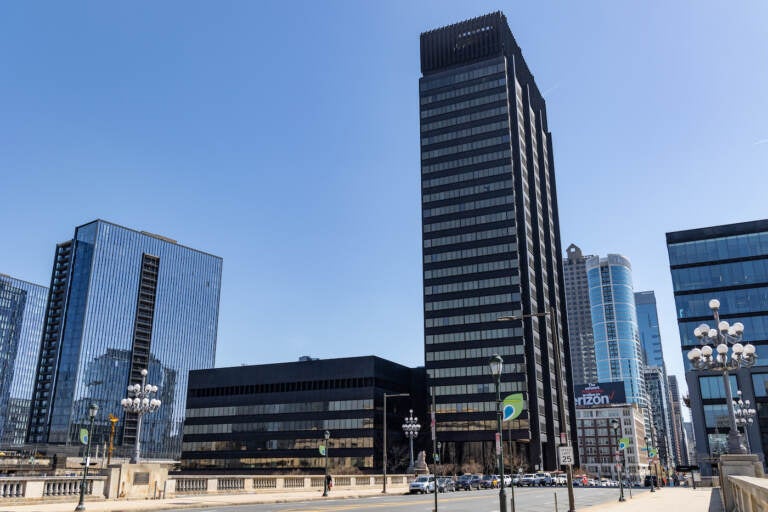
Center City, Philadelphia. (Kimberly Paynter/WHYY)
Philadelphia City Council members may vote to reduce the tax burden on businesses and employee salaries in the coming weeks, if the proposed budget is approved without much revision.
The fiscal year 2024 budget, which was introduced by Mayor Jim Kenney in March, begins on July 1. That means the city council is expected to vote on it by late June.
Philadelphia City Council held another public hearing to discuss the budget, which included cuts to its Business Income and Receipts Tax and the city wage tax on workers, on Tuesday afternoon.
It’s a tiny cut, less than 1 percent. But supporters say it’s a step in the right direction.
Last year, the Business Income and Receipts Tax was cut from 6.2% to 5.99%, a major step as the city had not reduced the business tax under 6% since the late 1980s. As proposed, the business tax would be cut again from 5.99% to 5.83%, according to city legislation.
But some business advocates are pushing for a much bigger cut. The Philadelphia Chamber of Commerce, which represents about 1,500 businesses citywide, is pushing to slash the business tax down to 3% in the next 10 years.
“The amount of the reductions [last year] were very small but we were thrilled that it was changing the direction Philadelphia was going with this tax structure,” Chellie Cameron, president and CEO of the The Chamber of Commerce for Greater Philadelphia said. “[This year] It was less than the amount that ultimately passed last year but we do think that continued investment over a period of years of 1% is what we need to get ourselves back in a real competitive spot.”
The overall Business Income and Receipts Tax is technically two different taxes lumped together. The Net Income tax is levied on business profits and the Gross Receipts Tax is based on sales before expenses are considered. So in theory, a business could not turn a profit and still pay Business Income and Receipts taxes in Philadelphia.
“We are the only major city that still double taxes its businesses,” Cameron said. “When we talk to businesses that are potentially looking to expand or stay or leave or come to Philadelphia, the wage tax becomes an issue.”
Just a few weeks ago, Cameron said that a company that considered doing business in the city said that the wage tax means it needs to pay higher salaries to offset the tax in a competitive labor market.
The city wage tax is 3.79% for residents and 3.4% for non-residents. The proposed city wage tax is 3.75% as a small cut but the non-resident rate would remain the same.
As proposed in the outgoing mayor’s budget, neither the business tax nor the wage tax would drop any further through 2028.
During a recent city public hearing, leaders of a coalition of diverse chambers of commerce in the region said that lowering taxes isn’t enough but it’s a good sign.
“Lowering the BIRT and wage tax once is not sufficient for long-term economic growth,” said Jennifer Rodriguez, president and CEO of the Greater Philadelphia Hispanic Chamber of Commerce during the April 18 hearing. “For businesses to make long-term significant investments that will bring about sustained job growth we need a more competitive cost structure.”
About nine in ten businesses that file the city business tax have fewer than $1 million in gross receipts and hundreds of thousands of businesses have about $100,000 in gross receipts, according to the Philadelphia Revenue Department. It’s the third largest source of revenue for the city’s general fund and is expected to add $709.1 million in fiscal 2024 to city coffers.
Commuting patterns in Philadelphia are relatively uncommon as two out of five workers travel to the suburbs but live within city limits.
The Pew Charitable Trusts analyzed U.S. Census data in 2018 that found roughly 40% of Philadelphia residents reverse commute to work in the suburbs. But the surrounding counties either do not have a wage tax or levy 1% on employee salaries.
“You’re paying a 3.8% wage tax and you’re working alongside suburban residents doing the same job and they’re paying a 1% wage tax,” said Paul Levy, president and CEO of Center City District. “So that’s been a huge incentive for employed people to move to the suburbs. And then on budget, none of the surrounding counties, none of the surrounding townships have a tax on both gross receipts.”
The Philadelphia City Council’s legislation for the city wage and business tax cuts are identical to the mayor’s budget right now. If approved, the city would collect $14.5 million less during the first year and $75.3 million less over a 5 year period, according to city officials.
Councilmember Isaiah Thomas, who sponsored the city tax cut legislation, deferred comment for this story.
“If these numbers work out that we can further reduce taxes and not cut any city services, then we would be in support,” said Max Weisman, communications director for councilmember Thomas. “But if there’s a situation where we have to choose between tax cuts and cutting library hours or rec centers or anything like that, he’s not going to choose that.”
But that’s an unlikely scenario.
“We have made slow and steady progress towards improving the tax structure in Philadelphia, but it has only improved at the margins,” said Brett Mandel, a former executive director of Philadelphia Forward who is a business consultant and a member of the voter-created Philadelphia Tax Reform Commission. “We’re still taxing too much. We’re still taxing what other localities and other cities do not tax and we’re still not taxing fairly. We have been lowering tax rates in Philadelphia for decades. We have more tax revenue than ever.”
One local policy think tank suggests that steady change would be the best path forward as larger issues are tackled too.
“Incremental change to the BIRT tax is the most responsible thing we can do,” said Jeff Hornstein, executive director for the Economy League of Philadelphia. “Incremental change to the wage tax, exempting low-income workers or giving them a tax credit, which we’ve done now and exerted some great leadership there.”
Hornstein would propose to reverse a previous move where the city exempted the first $100,000 of business income starting in 2016. He would raise that cap to $250,000.
“We would capture the vast majority of small businesses,” he said. “On the other hand, there are lots of big businesses that don’t pay the business income and receipts tax. It really only applies to companies that are truly locally based. So a national corporation that happens to have an office here, their accountants make sure they don’t make any profit in Philadelphia.”
And it’s difficult for many Black and brown entrepreneurs to start the next generation of businesses or even for marginalized people to be successful in the workforce.
“Our much bigger problem than any of this is that we have a workforce that is disenfranchised due to mass incarceration that is not part of the labor market,” he said. “And to me, that’s the biggest drag on [business] growth here.”

Get daily updates from WHYY News!
WHYY is your source for fact-based, in-depth journalism and information. As a nonprofit organization, we rely on financial support from readers like you. Please give today.


